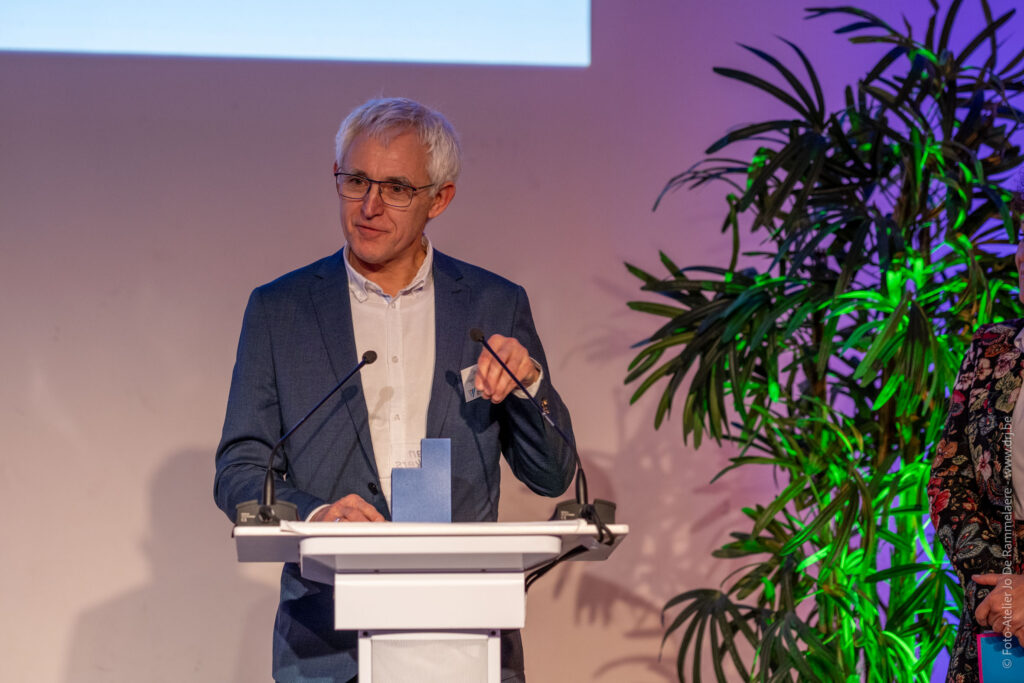Pioneer in the spotlight: Johan Gemels 15/02/24
< Retour à la listeSource: https://multimodaal.vlaanderen/baanbreker-in-de-kijker-johan-gemels/
Author: -
Pioneer in the spotlight: Johan Gemels
Johan Gemels is the winner of the Baanbrekers award of Multimodal Ambassador 2023. Johan Gemels was one of the founders of various intermodal terminals in Belgium, both bi-modal and tri-modal such as Combinant, Antwerp Main Hub, Liège Container Terminal, Liège Logistics Intermodal , Tri-Modal Terminal Brussels, Associated Terminal Operators and many others. We asked him his opinion about multimodal transport in Flanders.
What was the direct reason for you to start with multimodal transport?
JG: I kind of fell into it by accident. I actually come from the IT sector. My first job in the transport world was at NMBS. In the early 1980s we already operated a few inland container terminals there. There I quickly got into sales and saw the possibilities of intermodal.
What was the biggest hurdle you had to overcome?
JG: The biggest hurdle is in people's minds. Intermodal transportation seems difficult from the outside. It's also a little harder to start. But once it's running, it's often easier and people who use it never want to take the opposite step again. The smaller the company, the more difficult it is to convince people. Companies that only have a container occasionally will of course benefit less from it. But if you have a regular supply, such as a coffee roasting plant, you want it to run continuously.
“Companies that use multimodal transport never want to take the opposite step again.”
If a load arrives in Zeebrugge and it has to go to Liège, we can take it directly to Liège by train, instead of first passing through Antwerp. Then you win two days. But for some customers this remains a difficult step.
Events such as those of Multimodaal.Vlaanderen are good for this. You will hear many positive experiences there. Although the companies that are difficult to convince are also more difficult to get at those events. But for people who have doubts, such events are ideal. In any case, they are persuaded by other companies.
What is also encouraging to see is that many logistics real estate builders choose locations around inland terminals. That is a very positive development.

How do you see the multimodal landscape evolving?
JG: For now we have the wind in our sails. It has ecological advantages. In terms of cost, it is also doable. There is growth in the market. Although it is still not growing fast enough. But awareness among companies is increasing. To say that it will double in 5 or 10 years, as the EU has in mind, seems a bit too optimistic to me.
In the long term, we also have to look at what technological solutions are still coming our way. The major advantage of intermodal transport has long been its ecological footprint. The question is what will happen if the trucks all become electric.
There are also developments in the rail sector, such as self-driving wagons. The question is how quickly the government will allow experimentation with it. The Flemish Waterway has allowed autonomous sailing and the whole of Europe has been watching it. For rail, you also need a pioneer who dares to do that. We are already learning a lot from the ongoing tests. But it is time for the government to start thinking about it.
“Grant money that now goes to 100-year-old rail technologies would be better spent on research.”
I see this developing positively in the long term, but we should have been working on it for a long time. We now maintain rail technology from 100 years ago with subsidies, because it has not yet been modernized. We would be better off spending that money on research. We've already waited too long. Technology will help us move forward. But the government must also allow this to happen.
What position has your award been given?
JG: It's still at my house for the time being, but I'm going to take it to Liège soon.





